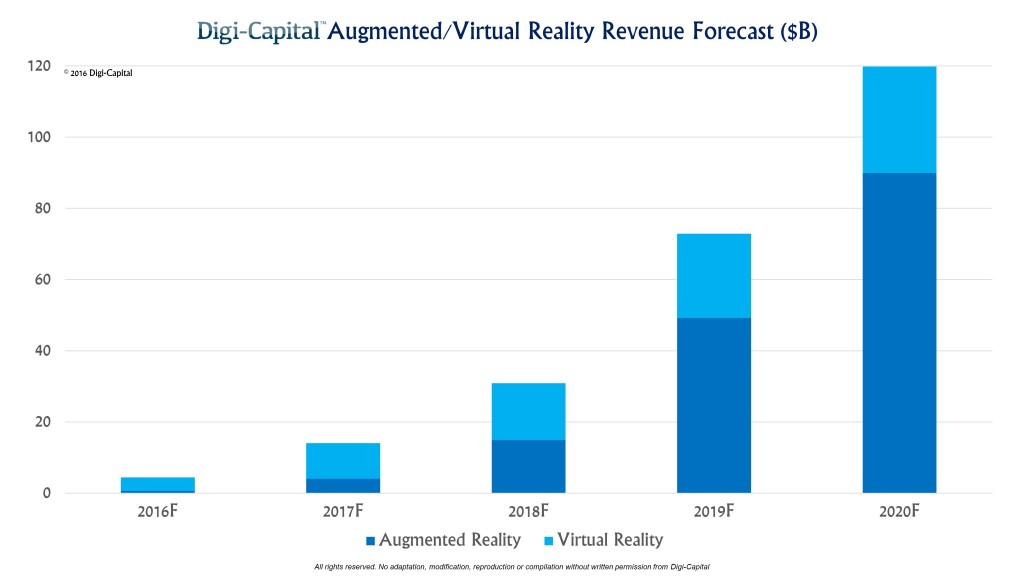To say that smartphone industry is big would be an understatement. With approximately 2.1 billion smartphone users worldwide and a global sales value of nearly US$429 billion in 2016, the smartphone industry is one of the biggest in the world. So much so, that a sizeable share of the world’s economy is contingent on the production and sales of smartphones. Companies like Google and Apple were the trailblazers who shaped the smartphone as we know it today and are now reaping its benefits. However, nothing in the world of technology is permanent, and companies are now preparing for the inevitable death of the smartphone and what is to come after. The industry is now betting that Augmented Reality (AR) is going to be the next chapter in the tech revolution.
Augmented Reality: The Next Frontier
A new buzzword that has been gaining traction with some of the biggest tech companies today is Augmented Reality (AR). The basic idea behind AR is to provide a composite view by superimposing information and images over the real world via a digital interface. This concept has been around for a while. It first debuted with Google’s Glass headset in 2014. The Glass, however, was mired in issues related to the early adoption of new tech and privacy concerns. It was ultimately discontinued in 2015 by Google.
However, it seems that the industry has not been deterred by the failure of the Google Glass. Giants like Apple, Microsoft, Facebook, Snap and Magic Leap are now chasing the AR dream. Many believe that Augmented Reality may well be the next chapter in personal computing, and for a good reason. Digi-Capital forecasts predict the Mobile AR could become the primary driver of a $108 billion VR/AR market by 2021, where AR will take the lion’s share of $83 billion and VR will take the rest $25 billion. In the short term, CSS Insights pegs AR headset sales to bring in $1.2 billion in revenue in 2017 alone.
Interest in AR development is an all time high. Angel lists 965 Augmented Reality startups worldwide at the time of writing, with an average valuation of $4.7 million. The most prominent of these is AR startup Magic Leap, which is valued at $4.5 billion. In 2016, a record $2.3 billion were invested in VR/AR startups.
Facebook Enters The Race For AR
Besides the usual suspects of Microsoft, Apple and Google, Facebook is investing heavily in AR. Facebook CEO, Mark Zuckerberg recently unveiled his plans to “mix the physical and digital in whole new ways” using AR. As pioneers of modern social media, Facebook has built a wildly successful $415 billion ad business. However, this business is built upon an infrastructure laid by Google and Apple in an ecosystem owned by them.
Facebook is betting big that AR will spell the death of the smartphone in coming years. In fact, Facebook’s Michael Abrash believes that this will occur by 2022. To be first to the top of the AR mountain, Facebook has created a top secret division called “Building 8”. Researchers in Building 8 is reportedly working on Augmented Reality, consumer drones, brain scanning, skin sensing technologies. This is all part of Facebook’s larger effort to diversify into hardware and create the dominant AR software ecosystem of the future. The premier highlight of this division is their work on a BCI – Brain to Computer Interface. Research on input and interface technologies will be critical in overcoming the hurdles currently holding AR back.
As the acceptance of AR will rise in the market, analysts believe that the mix of various technologies led by AR will replace the smartphone for a better future. The on-the-move communication channels are bound to go through major reforms in the next few years and AR will play an instrumental role in it.
Current State Of The AR Market
AR may be poised to rule the future, but the industry is still in its infancy right now. Even with a negligible revenue share in 2016, it is set for explosive growth in the next few years. We got the first glimpse of AR’s potential last year with Niantic’s AR based mobile game Pokemon GO. It became the worldwide phenomenon and the fastest mobile game to rake in $600 million revenue by doing it in 3 months. Although Goldman Sachs predict AR adoption to be slow, it’s large potential notwithstanding.
The AR race, however, is only getting started. Apple has entered the field in typical Apple fashion; by buying AR startup Metaio. Microsoft is betting big on their HoloLens technology, which is already being used by NASA. Despite their failure with Google Glass, Google has doubled down on AR with Tango. Snapchat is pioneering AR in the social media space, with their new rear camera lenses representing an impressive display of AR technology. There is also the bevvy of AR startups, led by the Google-backed Magic Leap. The interest in Augmented Reality is slowly building to critical mass, and it is only a matter of time before this technology becomes available for widespread consumer adoption.
Takeaways
- The AR market is set for incredible growth in the next few years. It may well become the most popular personal computing platform in the near future, making the smartphone obsolete.
- Facebook is investing heavily in AR to create the dominant AR ecosystem in the future. This is part of Facebook’s attempt to diversify from their ad based revenue model to hardware and software platforms.
- Adoption forecasts for AR predict slower adoption rates than for smartphones. However, the potential for this industry remains huge. Companies investing in AR ecosystems right now may find themselves in a very strong position in the future.
- Widespread AR adoption is still some years away. This is primarily due to limitations with input interfaces, battery and seamless internet connectivity. While AR may rule the future, the smartphone is here to stay for the time being.


